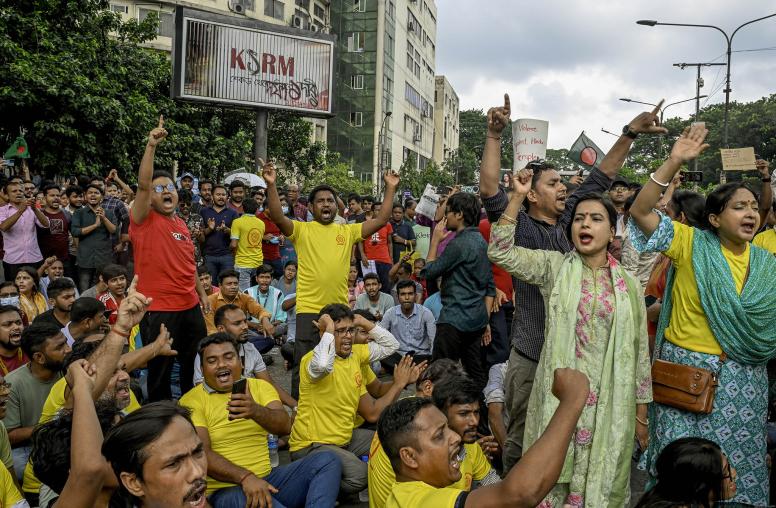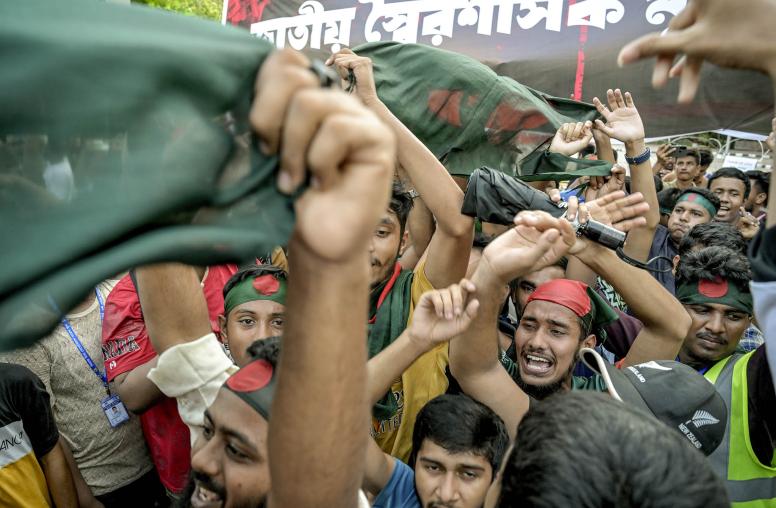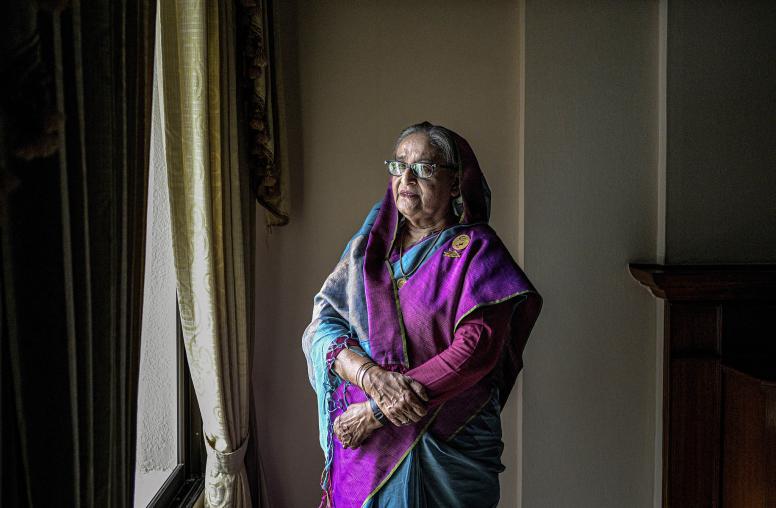The Future of Democracy in Bangladesh
A surprising turn of events in Bangladesh in early January that could crush Bangladesh's fragile democracy has received little international attention. USIP recently convened a panel of experts to discuss the future of democracy in Bangladesh.
In early January, in a surprising turn of events, the head of Bangladesh's caretaker government, Iajuddin Ahmed, stepped down under military pressure. As he did so, he declared a state of emergency, suspended civil liberties, and indefinitely postponed Bangladesh's elections, which had been scheduled for January 22, 2007. Fakhruddin Ahmed replaced him as head of the caretaker government. Most of these events have taken place with relatively little attention from the international community.
To consider the significance of these developments, the Center for Conflict Analysis and Prevention at the U.S. Institute of Peace convened a round-table meeting to discuss the future of democracy in Bangladesh. This meeting brought together several renowned experts on Bangladesh, including T. Kumar, advocacy director of Amnesty International; Peter Manikas, senior associate and regional director for Asia at the National Democratic Institute; Cynthia Bunton, regional program director for Asia at the International Republican Institute; and, Ambassador William Milam, senior policy scholar at the Woodrow Wilson Center.
This USIPeace Briefing highlights the central points made by the speakers as well observations and contributions from the audience. It was written by Pavithra Banavar and Nicholas Howenstein, respectively research assistant and senior program assistant in the Center for Conflict Analysis and Prevention. The views expressed in this paper do not reflect those of USIP, which does not advocate specific policy positions.
Overview of the Recent Developments
As mandated under Bangladesh's constitution, a caretaker government came to power in October 2006 when the five-year tenure of the Bangladesh National Party-led government concluded. The caretaker government then had 90 days to hold free and fair elections, and Bangladesh's Election Commission designated January 22 as the election date. However, an increasing and serious number of electoral irregularities since 2005 raised suspicions about the neutrality of the Election Commission and cast increasing doubt about the legitimacy of the pending elections. In early January 2007, the Awami League-led fourteen party alliance announced it would boycott the elections, claiming that free and fair elections would not be possible.
At least one panelist noted that the Election Commission did much to push the Awami League coalition toward their decision. It published a voter list rife with inaccuracies and ignored a ruling by the Bangladesh High Court to repair the list. The Commission also ruled Hussain Muhammad Ershad, a major ally of Sheikh Hasina's Awami League, ineligible to participate in the election. Most observers credit these two events with triggering the Awami League-led boycott. Following the pullout of the Awami League alliance, international election monitoring missions cancelled their observation programs and the United Nations withdrew its electoral support.
In the wake of those developments, on January 11, 2007 the caretaker government postponed the elections, declared a state of emergency, and Iajuddin Ahmed resigned from his post. Panelists discussed the possible motivation for Iajuddin Ahmed's actions and the apparently ill-founded rumors that it enjoyed some level of support from the international community. One speaker drew attention to a statement issued by the United Nations Resident Coordinator in Bangladesh.1 This document expressed concern about the deteriorating political situation in Bangladesh and cautioned the army against supporting a one-sided election, as doing so might affect their future participation in lucrative UN peacekeeping operations. The military leadership reportedly presented this document to Iajuddin Ahmed as justification for their intervention and their concomitant demand that the election be postponed. Some panelists saw this justification as disingenuous at best since the UN clearly did not intend the army to intervene in this way. One panelist questioned whether the UN has procedural means to bar the Bangladesh army en masse from peacekeeping operations.
The current head of the caretaker government, Fakhruddin Ahmed, has promised to get tough on corruption and violence and to hold free and fair elections as soon as possible. His claims notwithstanding, most observers doubt that elections will happen any time soon because the stated pre-conditions for rescheduling elections are difficult to attain. Among them: a restructured Election Commission; a clear and accurate voter registration list; and most problematic, the promulgation of a voter registration card process. The panelists believed that such identification cards could not be developed and implemented within a year. In fact, most round-table participants believed it would take several years to accomplish. Most importantly, given that the constitutional tenure of the caretaker government has lapsed, the interim government rests on shaky constitutional grounds. Any initiatives that will prolong the return to democracy risk increasing destabilization.
Currently the army and the security forces are deeply involved in mass arrests in Bangladesh, ostensibly in the service of the government and its state of emergency. Since Fakhruddin Ahmed took over, tens of thousands have been arrested and several dozen people have died. Many political leaders and ministers have been detained in a much-lauded "anti-corruption" campaign. One roundtable participant contended that this crackdown has resulted in severe human rights violations, which require immediate redress. Another participant decried any efforts to grant security forces immunity for their actions, as happened earlier during Operation Clean Heart.2
Despite these concerns, another presenter observed that while the state of emergency has coincided with human rights abuses, the alternative to the army's intervention could have been far more severe. Had the caretaker government overseen a dubious election, the opposition had vowed to take to the streets perhaps sparking even greater violence.
Implications for Democracy in Bangladesh
Opinions on the gravity of the situation varied greatly. One panel member looked at the situation from an historical perspective and noted that past military interventions in Bangladesh have all seen power returned to civilian hands. In fact, the current military intervention lacks the period of strict martial law that historically preceded the return to civilian control. This panelist sees an army that is readily willing to turn power over to a civilian body. This could change, however, should the military acquire a taste for power. However, the army understands that running Bangladesh is a difficult job and is not interested in taking on that task. Moreover, this participant argued that as an institution, the army is much more concerned about its international image than are the civilian political leaders. This will deter the army from embracing options such as martial law.
Representatives of the human rights community, however, argued that the situation is much more worrisome. According to one panelist, since 2002 the BNP government has deployed military police and Rapid Action Battalions (RAB) in the name of protecting citizens and fighting crime. The government has not held the offending military and police personnel accountable, and consequently extra-judicial executions, arbitrary arrests, torture, and forced confessions are common. The unelected interim government retains the ability to deploy military and RAB forces with little oversight and accountability.
One panelist specifically cautioned that the current situation affords the military and police forces the requisite protection to carry out these human rights violations impunity. While these human rights concerns are valid, they are not the only considerations when evaluating the role that RAB plays in Bangladesh's security environment. The RAB is, for better or for worse, the only counter-terrorism force in the country. As such, it cannot be isolated or marginalized given the intense U.S. concerns about Islamist terrorism in Bangladesh. The international community needs to find ways of working with RAB despite its numerous shortcomings because of its counter-terrorism role. One audience member noted that U.S. laws, such as the Leahy Amendment, make working with RAB very difficult because that law forbids the U.S. to train security personnel who have been credibly accused of human rights violations.
The developments that have unfolded during this crisis likely will have numerous consequences for the future of Bangladesh's democracy and political fabric. It is too early to say how the two mainstream political parties, the Bangladesh National Party and the Awami League, will fare under the sustained efforts to arrest political party activists. Some panelists and attendees expressed concern that Bangladesh's Islamist parties will benefit from the emerging power vacuum and from the army's likely efforts to buttress its legitimacy by appropriating Islam.
Moreover, the current governance situation will likely have an effect on multilateral donors' decision-making. One speaker reminded the audience that donors are hesitant to make loans to countries that lack a functioning parliament because parliaments typically ratify such agreements. Should the current governance structure preclude desired loans, the interim government may feel pressure to call parliamentary elections. Given the governance challenges, one speaker wondered how long the interim administration could sustain itself with just a team of ten advisors and no sitting parliament. Indeed, the fragility and vulnerability of the caretaker government derives from the fact that there is no popularly elected legislature. While the public appears to support the military's intervention at present, this could change should the army sustain its interference in governance and should the interim government defer the restoration of democracy.
There is evidence that this intervention was met with public support, but the panel questioned how long the public will remain patient. This is due to a number of recent changes in Bangladeshi society. Since the mid-1990s, Bangladesh's middle class has grown and become increasingly vocal about its own economic interests. Bangladesh's civil society has also grown stronger and is more capable of challenging the government. A vibrant business class has emerged that is increasingly interested in securing Bangladesh's business environment. Finally, while Bangladesh's media has been deeply polarized historically, more independent and neutral media outlets and journalists have emerged who are willing to challenge the government. These factors suggest that Bangladeshis may grow weary of the military more quickly than in the past. The military may not be able to maintain its legitimacy if it remains in power indefinitely. One speaker observed that should widespread demonstrations take place as democracy is denied, the army would likely retreat to its barracks. This speaker doubted that the army would be willing to take up arms against the general public should it be called upon to quell an uprising.
Courses of Action to Restore Democracy
Roundtable participants laid out several benchmarks to establish Bangladesh's course back to a democratically elected government, specifically:
- Lift the state of emergency and re-establish civil liberties. These steps need to take place notwithstanding any public support the current military-backed government enjoys. The military intervention prevented what certainly would have been flawed elections, but the panelists all agreed that civil liberties, freedom of speech, and freedom of the press must be restored.
- Expand transparency in electoral process. Panelists called for a greater degree of general transparency in the electoral process. Presenters argued that voter registration and voters' identification cards are the most crucial issues. However, they voiced concern over the timeline for establishing a reliable voter identification system. Setting up an identification card program will be a very drawn out process and may be a ruse to delay restoration of democracy. Such delays may strain the public's patience with the interim administration.
- Military must return to their barracks. Several panelists also expressed concern about the current and future role of the military. Most panelists believed that the army "needs to return to the barracks." One presenter specifically called for an end to arbitrary arrests and for the caretaker government to rein in the military and the police.
- Human rights abuses must stop and perpetrators held accountable. One panelist stressed the numerous human rights abuses perpetrated by the security services. The speaker urged the caretaker government to issue a public statement denouncing these abuses and to refrain from passing legislation that would render abusers immune to prosecution. The interim administration must send the message that it will no longer tolerate the impunity with which the security services act.
Means of Suasion
In a grim assessment, one speaker described the current situation as a "serious policy dilemma" for the international community. Apart from exhortation, panelists and participants alike agreed that there are few tools that the international community can use to compel Dhaka to restore parliamentary democracy, improve governance and justice provision, diminish the politicization of the bureaucracies, restrain Islamist militants, and improve law and order. Limited options notwithstanding, all members of the panel agreed that the donor governments should make an active effort to get Bangladesh's democracy back on the right track.
Historically, Bangladesh has responded to exhortation by the international community. But the donor countries must develop and employ a unified voice to achieve maximum effect in Dhaka. In this regard, one panelist positively noted that there had been a coherent push from the international community over the past six to eight months regarding the then-scheduled January 2007 elections. Panelists urged donor countries to resist funding problematic aspects of the interim government's agenda such as the voters' registration card. Noting the importance of unity, one panelist expressed concern that different countries held different views on key issues such as the voter identification card. While many countries declined to fund it, the Chinese government has offered to support this program.
Finally, the panelists and the audience believe that the members of a unified international community should focus on the electoral process and broader systemic institutional problems. In other words, there should be a focus on "institutionalizing reform." One option would be to focus on the political parties and push for internal reforms and political party laws. Panelists generally concurred that this reform can happen only with the involvement of the parties. Any efforts towards reform that exclude the parties will be reversed as soon as the political parties regain their power. While recognizing the need for parties, panelists were cognizant that the parties themselves are the real barriers to reform. The parties themselves are not democratic. Party leaders are not elected by party members and both the Awami League and the Bangladesh National Party operate as de facto dynasties under their strong and entrenched leadership structures with little will or ability to aggregate interests.
Notes
1. Office of the United Nations Resident Coordinator in Bangladesh, "Press Statement by UN Resident Coordinator, Ms. Renata Lok Dessallien, Dhaka," January 11, 2007. Available at http://www.un-bd.org/undp/media%20releases/2007
/UN%20Resident%20Coordinator%20Statement%20-%2011%20Jan%202007.pdf.
2. In October 2002, the BNP government called upon the military to conduct Operation Clean Heart, which was purportedly a crackdown on the rampant crime that had gripped the country. That operation was also met with allegations of human rights abuses by the military.
This USIPeace Briefing was written by Pavithra Banavar and Nicholas Howenstein, respectively research assistant and senior program assistant in the Center for Conflict Analysis and Prevention. The views expressed are their own, and not necessarily those of the Institute, which does not advocate specific policies.
The United States Institute of Peace is an independent, nonpartisan institution established and funded by Congress. Its goals are to help prevent and resolve violent international conflicts, promote post-conflict stability and development, and increase conflict management capacity, tools, and intellectual capital worldwide. The Institute does this by empowering others with knowledge, skills, and resources, as well as by directly engaging in peacebuilding efforts around the globe.



